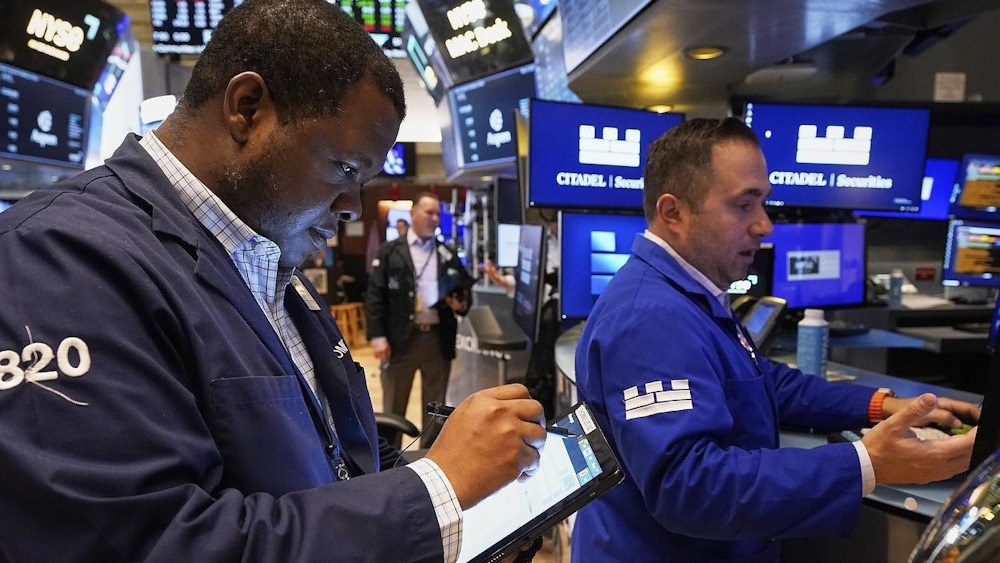
Dow Futures experience a slight decline following robust corporate earnings and favorable economic data that alleviated worries regarding elevated stock valuations. Certain members of the conservative supermajority on the U.S. Supreme Court exhibit doubts regarding the White House’s application of emergency economic powers to implement stringent tariffs. Qualcomm has issued a caution regarding potential business losses from a significant client, whereas Tesla shareholders are preparing to cast their votes on a $1 trillion compensation package for CEO Elon Musk.
Dow Futures indicated a downward trend on Thursday, following a recovery in the previous session, as concerns regarding high stock valuations impacted equities earlier in the week. By 02:27, the Dow futures contract had slipped by 42 points, or 0.1%, S&P 500 futures had fallen by 7 points, or 0.1%, and Nasdaq 100 futures had declined by 47 points, or 0.2%. The primary indices experienced an uptick on Wednesday, driven notably by significant advancements in large-cap technology stocks. The recent increase alleviated growing concerns regarding the sustainability of elevated stock valuations, particularly within the technology sector influenced by artificial intelligence. Supporting the prevailing sentiment were alternative data sources indicating that U.S. economic conditions remained robust in October. Officials and policymakers have faced a dearth of official figures amid a protracted government shutdown that has extended beyond a month. Reports indicate that legislators in Washington may reach a consensus to conclude the shutdown by the end of this weekend. Transportation Secretary Sean Duffy has cautioned that if the situation persists, air travel capacity at 40 major American airports will be diminished by 10% starting Friday.
Meanwhile, markets were reflecting a degree of skepticism among members of the U.S. Supreme Court’s conservative supermajority regarding President Donald Trump’s invocation of emergency economic powers to implement extensive tariffs. On Wednesday, the high court commenced oral arguments regarding Trump’s invocation of the 1977 International Emergency Economic Powers Act, or IEEPA, as a legal foundation for the imposed levies. The issue has escalated to the Supreme Court following determinations by lower courts that the president exceeded his authority through the implementation of the measures. Debate has emerged regarding the potential decision of the court’s 6-3 conservative supermajority, which comprises three appointees from Trump, on whether to uphold or invalidate the IEEPA tariffs. Throughout a significant portion of Trump’s second term, the Supreme Court has largely endorsed the White House’s initiatives to consolidate decision-making authority within the executive branch. Consequently, Chief Justice John Roberts’ incisive inquiries regarding the application of IEEPA to the duties elicited a degree of astonishment. The tariffs constituted a tax on Americans, as Roberts contended, emphasizing “that has always been the core power of Congress.” Bets that the tariffs will endure the fall diminished in prediction markets, although analysts noted that, should the levies not be maintained, investors might face a more unpredictable economic environment. Officials from the Trump administration have suggested the possibility of utilizing alternative legal avenues to sustain the president’s trade conflict.
Qualcomm’s shares declined by over 3% in after-hours trading following the announcement that it could potentially lose business from its primary client, Samsung Electronics, in the upcoming year. The announcement eclipsed the current-quarter sales and profit projections from the chip designer, which exceeded market expectations, largely driven by demand for premium smartphones. Qualcomm stands as a significant global provider of modem chips that facilitate the connection of these devices to wireless data networks. Samsung has been a significant contributor to these sales, utilizing the chips in its Galaxy S25 model phones. CEO Cristiano Amon indicated that Qualcomm is currently gearing up for a reduced contribution of its chips in Samsung’s forthcoming iterations of the handset, as per reports. In other developments, Arm Holdings, a competitor in the chip technology sector, reported a fiscal third-quarter outlook that exceeded expectations, driven by significant recent investments in AI across the technology industry. The shares of the U.K.-based group experienced an increase in after-hours trading.
Tesla shareholders are poised to make a decision today regarding a substantial compensation package for CEO Elon Musk, with at least one prominent stakeholder having already indicated intentions to oppose the proposal. Earlier this week, Norway’s sovereign wealth fund, the largest in the world, announced its decision to reject the approximately $1 trillion pay package proposed by Tesla for Musk, referencing concerns regarding the magnitude and implications of the award. Norges Bank Investment Management, responsible for overseeing the $1.9 trillion fund, expressed that while it “appreciate[s] the significant value created under Mr. Musk’s visionary role” at the electric carmaker, “we are concerned about the total size of the award, dilution, and lack of mitigation of key person risk.” However, Tesla’s board has indicated that if shareholders reject the compensation, there is a possibility that Musk — the world’s wealthiest individual – may depart from the company, which could lead to a decline in its stock price.
While last week’s Federal Reserve interest rate cut, along with policy holds by the European Central Bank and Bank of Japan, were largely expected, the Bank of England’s announcement later today remains highly uncertain. Market expectations indicate that the Bank of England is likely to maintain its current interest rates, although there remains approximately a one-in-three probability that the central bank may reduce borrowing costs by 25 basis points. Maintaining rates at their current level would mark the initial deceleration in a trend of policy easing that commenced last year. However, certain analysts are now anticipating a potential reduction due to recent consumer price inflation and wage data that, while still relatively high, have come in softer than anticipated. The Bank of England has persistently reduced interest rates at three-month intervals since August of the previous year; however, the continuation of this trend is now in question. Governor Andrew Bailey indicated in September that the future trajectory is “more uncertain.”
